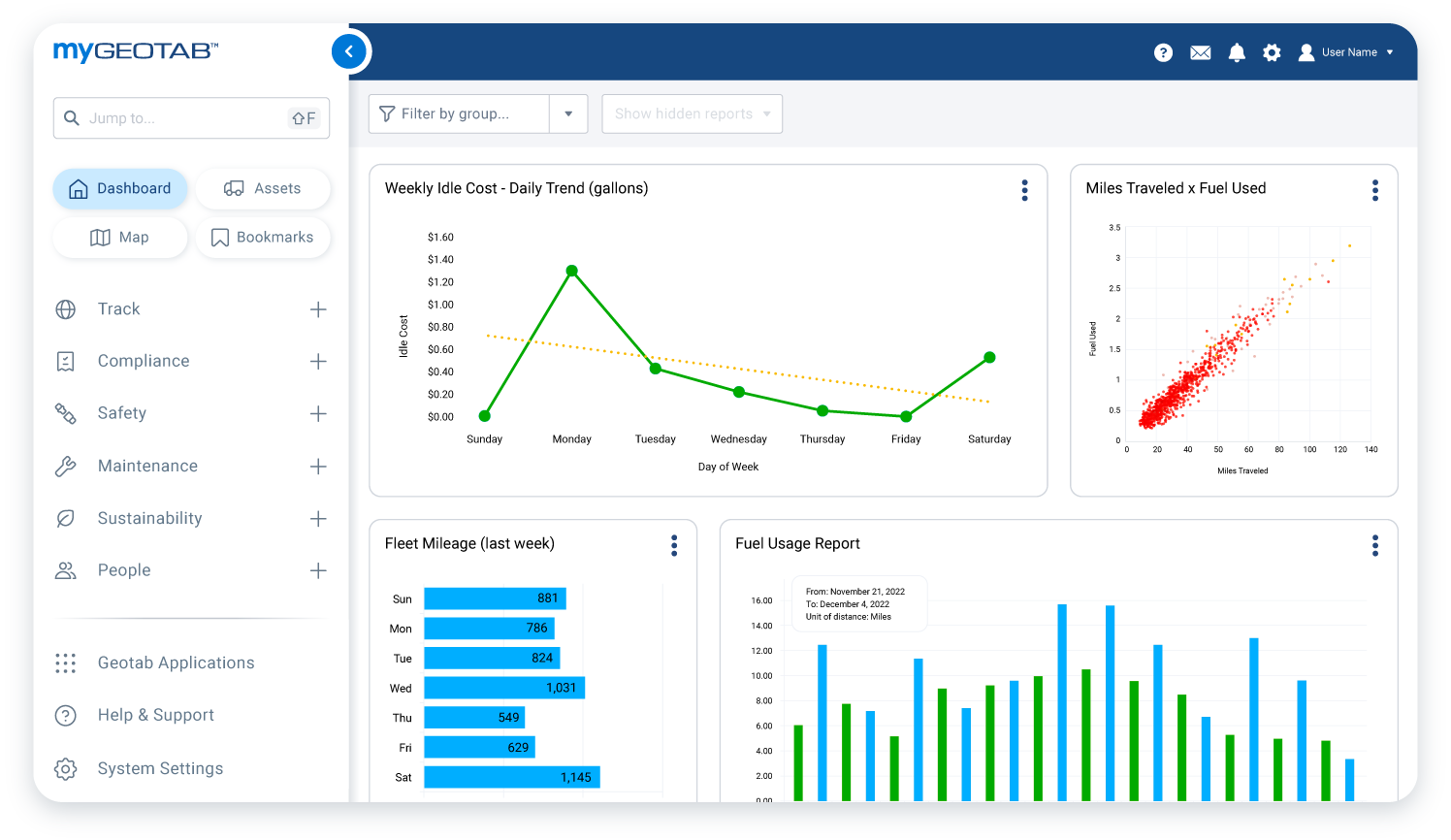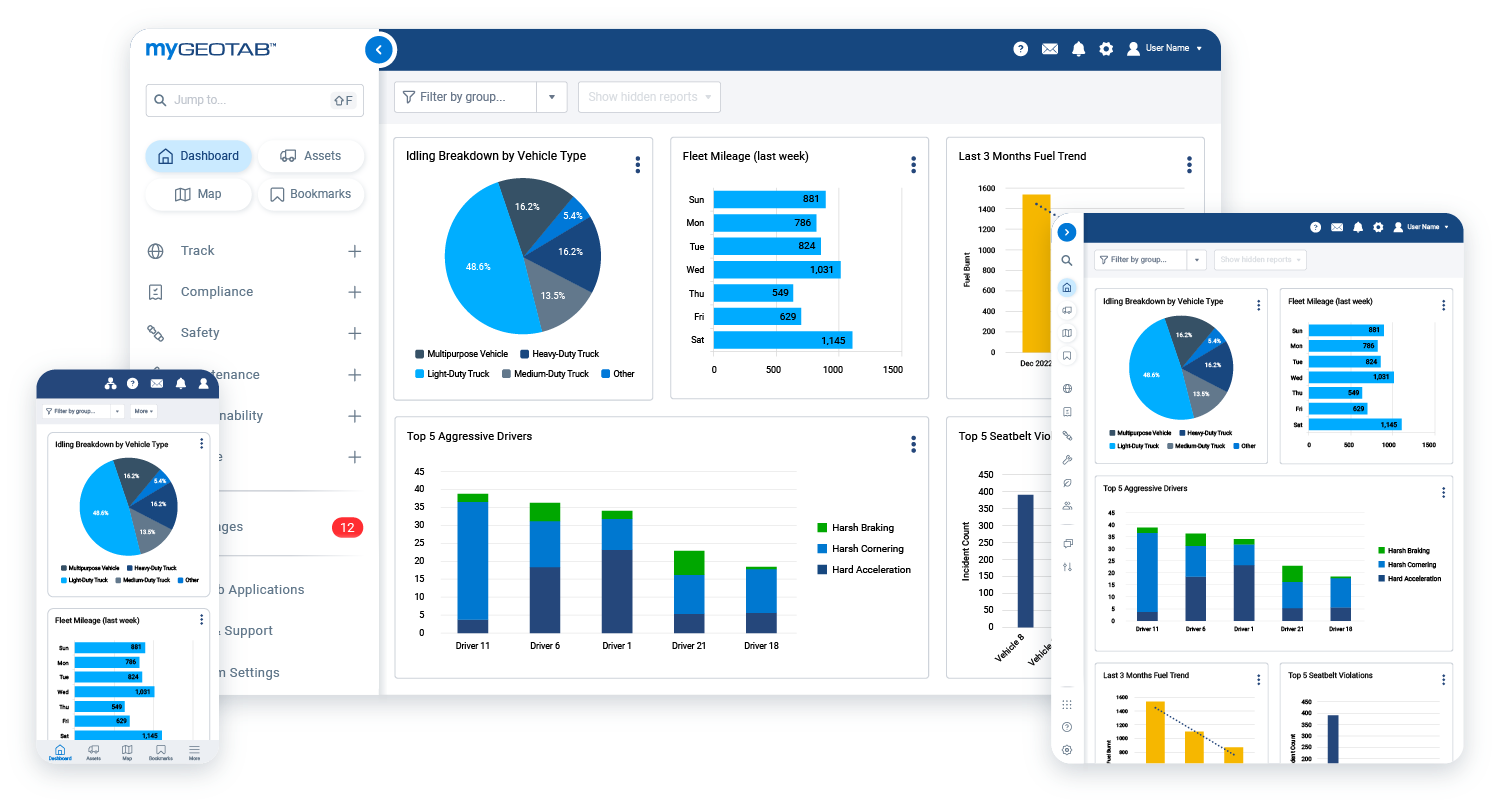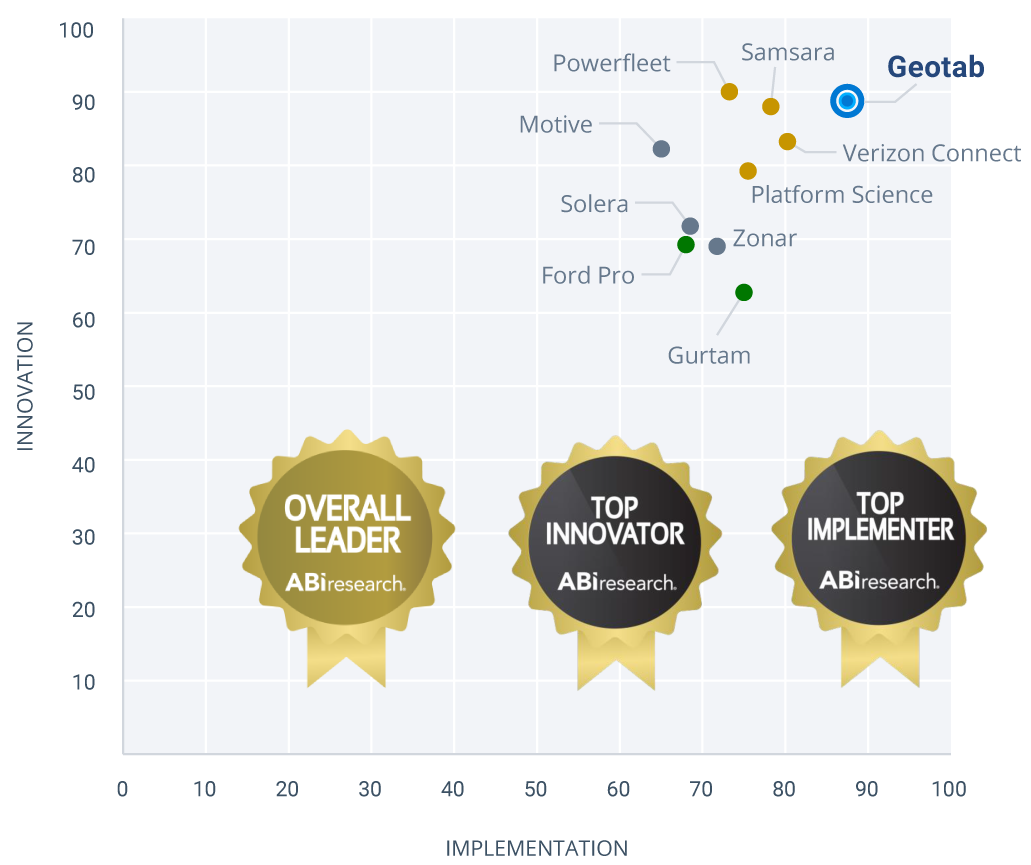Total fleet solution for global enterprise
Effortless global scalability: Seamlessly expand and manage your entire international fleet under a single, unified platform.
Data-driven performance optimization: Advanced data insights for vehicle performance, fuel efficiency, and overall global productivity.
Centralized command, localized control: Real-time view of your global fleet from a central hub, while maintaining local oversight.
Ranked #1 global telematics leader in the world

Conquer your global fleet's complexities
Global visibility
Data security & privacy
Cost reduction
Safety & compliance
Integration & scalability
Asset tracking & management
Geotab for global operational efficiency, visibility & unification

ROI & cost reduction
Geotab's solution drastically cuts TCO for global fleets by optimizing fuel, maintenance, and safety. Telematics enables an average of 20-25% fuel cost savings and prevents costly breakdowns through predictive maintenance, reducing unplanned downtime. Proactive driver safety can reduce collision rates by up to 40%, directly lowering insurance and repair expenses. This unified approach delivers significant ROI across your international operations.
Unified global reporting
For global fleets grappling with complex international operations, gaining a cohesive view of business is paramount. As the #1 Global Telematics Vendor, Geotab provides unified global reporting, consolidating data from multiple countries into a single customizable dashboard. Processing billions of data points daily from over 4 million vehicles tracked globally, Geotab’s powerful dashboard insights, robust benchmarking & ai capabilities, enable informed decision-making and optimized performance.


Flexible contract and partnership
Unlike many providers who may lock you into rigid contracts or force you into pre-determined solutions that don't quite fit, Geotab offers unparalleled contracting flexibility. We work closely with our global partners to ensure you secure the ideal agreement, uniquely tailored to your specific business needs. This commitment means you get the right solution, integrated seamlessly, on terms that empower your global operations, rather than restrict them.
Ranked #1 telematics provider worldwide
Operating in 160 countries, serving approximately 100,000 customers with over 5 million connected vehicles, Geotab has been ranked #1 telematics solution 4 years running. Download ABI Research’s independent telematics vendor comparison report for unbiased insights.

Commonly asked questions
What is global fleet management?
Global fleet management is the coordination, oversight, and optimization of a fleet of trucks, vans, or other vehicles that operate across multiple countries. Some of the common challenges of global fleet management include overseeing vehicle maintenance at scale, ensuring driver safety, and navigating regulatory compliance across different legal, logistical, and cultural environments. While this makes global fleet management a complex industry, it is also a rapidly growing one full of opportunities for fleets that can navigate its challenges with the right technology strategy.
If you are interested in expanding your fleet across North America or into Europe or Asia-Pacific, it’s important to know the opportunities and complexities of global fleet management. In this blog, we’ll explore why global fleet management matters, the key components involved like vehicle procurement and driver safety, how to handle cross-border operations and regulatory compliance, and how to choose a telematics partner for this evolving industry.
What is the important of global fleet management?
As the global supply chain becomes more interconnected, effective global fleet management is important to enabling reliable commerce across borders and maximizing business profits for transportation firms. A well-structured global fleet strategy can reduce operational costs, improve driver safety, and simplify compliance with international laws. And as fuel and maintenance costs rise while trade regulations shift, global fleet management has become critical to maintaining competitiveness in a demanding market.
For your fleet to efficiently operate internationally, you need a modern global fleet management strategy that embraces telematics technology to improve decision making across your operations. Let’s explore the key components of a successful global fleet management approach.
What are the key components of global fleet management?
Vehicle procurement and maintenance
Managing an international vehicle fleet means finding and servicing hundreds of different trucks, vans, and other vehicles across a continent. This requires keeping track of different manufacturers, regulatory standards, and vehicle specifications to plan your transportation operations and maintenance schedules. Successful global fleet managers build partnerships with local and international suppliers to ensure consistent procurement and maintenance workflows across borders while adopting proactive maintenance through telematics technology to keep vehicles on the road.
Safety and training
Driving and trucking laws can vary widely from country to country, and even from region to region inside each country. This means a global fleet’s driver training and safety policies must include all local regulations wherever vehicles will travel. It’s also important that drivers know what to expect from customs and border security procedures to ensure compliance and avoid delays. Beyond transportation rules, driver training should also include different languages spoken across relevant countries, which currencies they accept, and other key cultural differences.
Leveraging global buying power
The most effective global fleets know where to find the best prices for vehicles, insurance, component suppliers, fuel, and other essentials. By leveraging their size advantage over smaller firms, global fleets can negotiate better terms with suppliers, fuel providers, insurers, and maintenance vendors. Global fleets can also centralize purchasing to standardize parts, service agreements, and technology tools for improved cost control and efficiency.
What are the key capabilities required for global fleet?
Cutting-edge software
Technology is the backbone of global fleet operations. Platforms like Geotab offer advanced telematics solutions that empower large, multinational fleets by connecting all their assets in one system and transforming fleet and asset data into actionable insights. This means global fleet managers can automatically unify data from each asset and driver in their fleet to optimize operations by guiding international training programs, finding the most efficient routes, planning predictive maintenance schedules, and much more.
Real-time asset monitoring
Effective global operations require real-time visibility into every asset. With the right transponders and telematics technology, fleet managers can see where vehicles are and track their speed, fuel usage, engine health and more. This helps reduce delays from traffic, road closures, and busy border stations while enabling preventative maintenance that lowers the risk of breakdowns and unexpected downtime.
Tracking devices
Modern transponders and other tracking devices can collect a wide range of data from fleet vehicles. By integrating this data with AI-powered telematics platforms like Geotab, global fleet managers gain cross-border visibility over their fleet to plan the most efficient routes and prevent theft or other inappropriate vehicle use.
Let’s get you started
Discover how Geotab delivers scalable, reliable, and telematics solutions for multinational enterprises.


